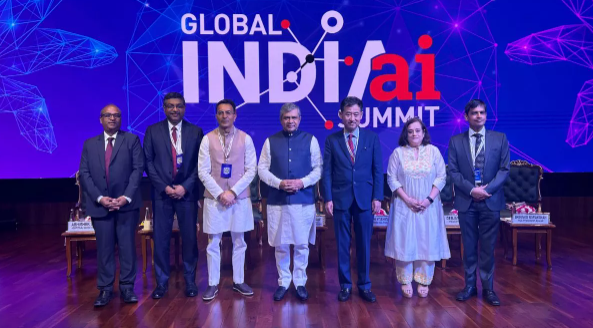Global IndiaAI Summit 2024 (GS Paper 2, International Institutions)

Introduction
- On July 3, 2024, New Delhi hosted the Global IndiaAI Summit 2024, where Ashwini Vaishnaw, the Minister of Electronics and Information Technology, delivered the opening address.
- Vaishnaw underscored the critical role of Artificial Intelligence (AI) in addressing global challenges, emphasizing that a unified global approach is essential for effective AI regulation and utilization.
- He highlighted that isolated efforts by individual countries would be insufficient to harness AI's full potential.
Emphasis on Global Collaboration
- The summit provided a platform for reflecting on AI advancements over the past year and initiating discussions on creating a cohesive strategy for AI regulation and application.
- Vaishnaw articulated the Indian government's vision of democratizing technology, ensuring that AI is accessible to all, rather than being dominated by a select few, such as large tech companies or governmental bodies.
India's Model for AI Utilisation
Public AI Platform
- Vaishnaw illustrated India's digital public infrastructure as a blueprint for making AI widely accessible.
- The Indian model prevents monopolistic control by any single service provider and ensures the benefits are distributed across a broad spectrum of society.
- The government plans to replicate this model in the AI domain by investing in a public platform equipped with essential tools, including:
- Computing Power: High-performance computing resources to support AI development and deployment.
- High-Quality Datasets: Access to diverse and rich datasets crucial for training robust AI models.
- Technical and Legal Frameworks: Comprehensive guidelines and regulations to ensure ethical and legal compliance in AI practices.
- This platform aims to empower startups, entrepreneurs, and researchers, fostering innovation and the widespread adoption of AI solutions.
AI's Impact on Key Sectors
Healthcare
AI is being leveraged in healthcare for various applications such as:
- Disease Diagnosis: AI algorithms that can diagnose diseases with high accuracy, enhancing early detection and treatment.
- Personalized Medicine: Tailoring treatments based on individual patient data, improving outcomes and reducing side effects.
Agriculture
AI applications in agriculture include:
- Precision Farming: Using AI to analyze soil health, predict weather patterns, and optimize planting schedules.
- Crop Monitoring: AI systems that monitor crop health and provide real-time advice to farmers, boosting yield and efficiency.
Education
In the education sector, AI contributes to:
- Customized Learning Plans: Developing individualized learning plans based on students' strengths and weaknesses.
- Interactive Learning Tools: AI-powered educational tools that enhance student engagement and learning outcomes.
Addressing AI-Related Risks and Challenges
Threats to Democracy and Misinformation
Despite its benefits, AI poses significant risks, such as:
- Threats to Democracy: AI technologies, like deep fakes, can undermine democratic processes by spreading disinformation.
- Misinformation: The rapid dissemination of false information through AI-driven platforms.
Cyber Security Measures
- The summit stressed the importance of collective efforts to manage and counter AI-related security threats.
- Ensuring a safe and secure AI environment requires global cooperation and proactive measures.
Conclusion: Vision for the Future
- The Global IndiaAI Summit 2024 concluded with a reaffirmation of India's commitment to fostering a collaborative, equitable, and secure future for AI technologies.
- The government's approach aims to balance innovation with widespread accessibility and stringent safety measures, ensuring that AI benefits all sections of society while mitigating its risks.
- The summit set the stage for India's next steps in AI, highlighting the importance of global partnerships and a unified strategy in navigating the AI landscape.


